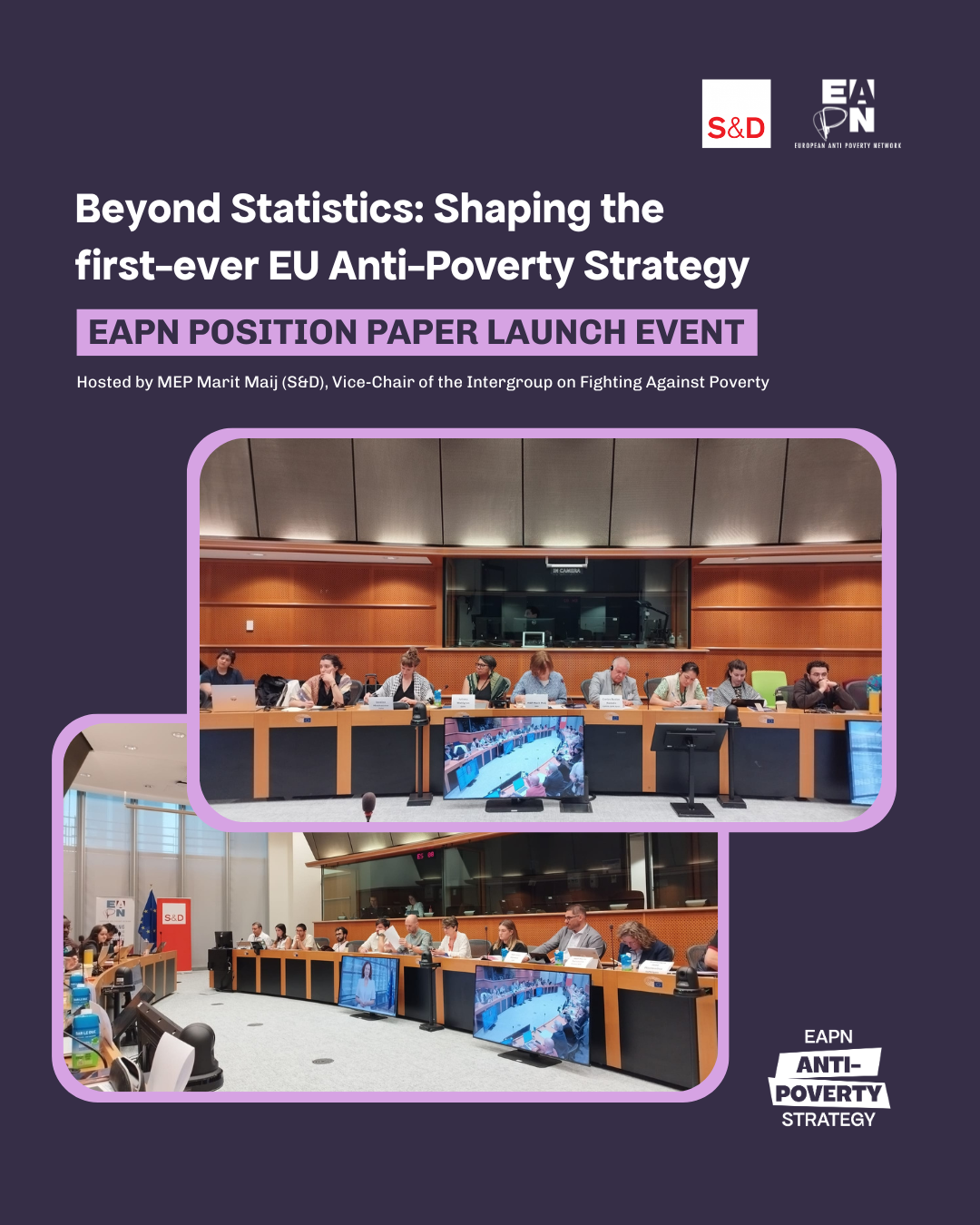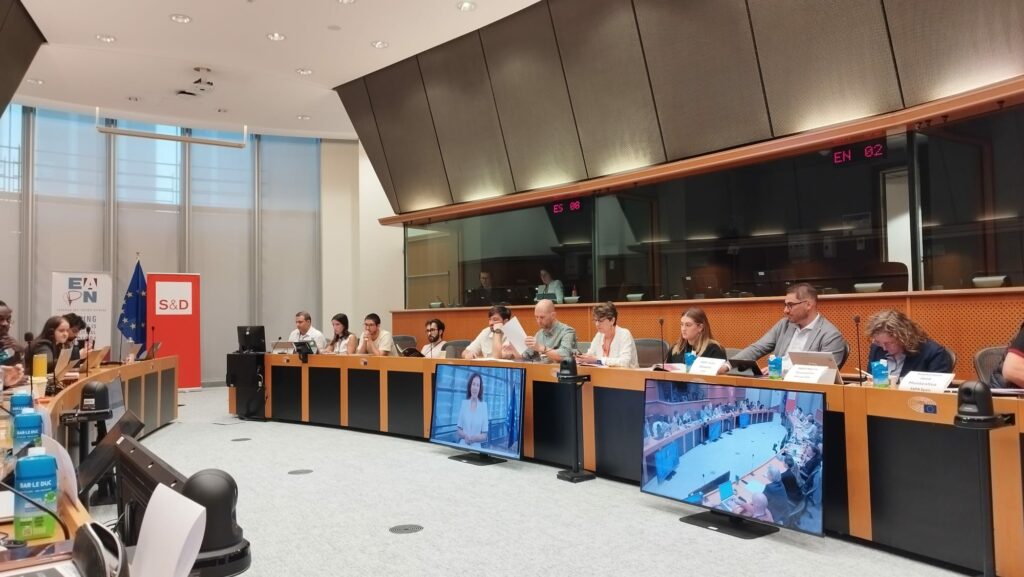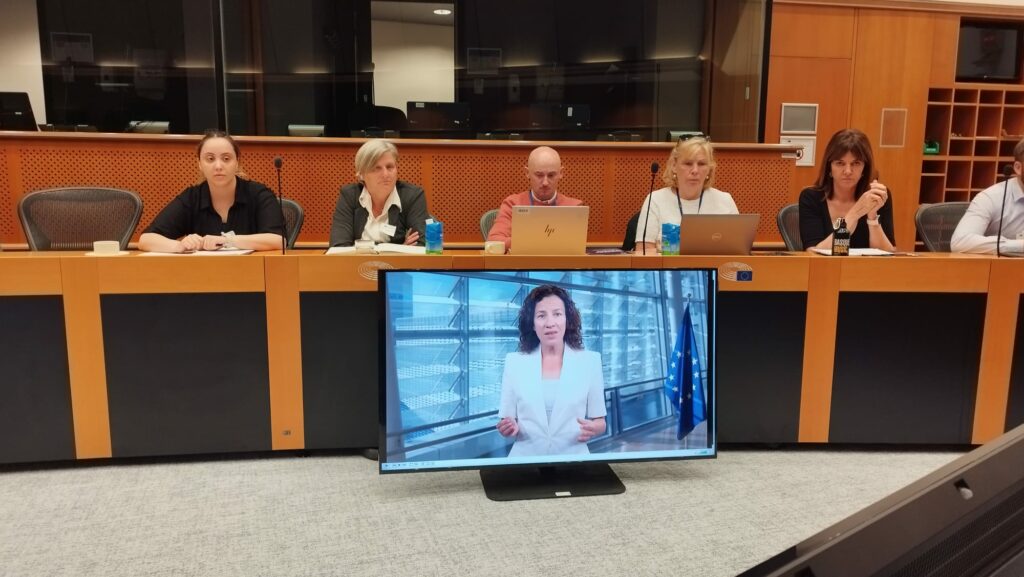
The European Anti-Poverty Network formally launched the Position Paper Towards the Eradication of Poverty at the European Parliament, at an event hosted by MEP Marit Maij (S&D), Vice-Chair of the Intergroup on Fighting Against Poverty.
The position paper is the result of collective work from our National Networks, European members and, most importantly, from people experiencing poverty. It is our vision and strategy for the EU Anti-Poverty Strategy.
While we all celebrate with great enthusiasm the political commitment to the first-ever EU Anti-Poverty Strategy, we also see with great concern the stagnation of the poverty numbers in the European Union, and the failure to meet the 2030 goal of lifting people 15 million of people out of poverty. EAPN is working tirelessly on promoting discussions about the content of the strategy with key stakeholders.
The message is clear: only an ambitious EU Anti-Poverty Strategy can eradicate poverty.
During the event, Jessica Machacova, EAPN Senior Policy and Advocacy Officer had the chance to introduce the main messages of EAPN vision to the EU Anti-Poverty Strategy reflected on the position paper:
- Eradicating poverty is a political choice. The first-ever EU Anti-Poverty Strategy is the opportunity to work towards poverty eradication.
- The EU should come up with an ambitious, comprehensive, rights-based and adequately resourced EU Anti-Poverty Strategy and go beyond the European Pillar of Social Rights.
- Participation of people experiencing poverty is crucial. They should be involved at all stages of the EU Anti-Poverty Strategy.

We had the chance to hear a message from Roxana Minzatu, Executive Vice-President for Social Rights and Skills, Quality Jobs and Preparedness. The European Commissioner highlighted the importance of a widely participatory process for the development of the upcoming EU Anti-Poverty Strategy, including not only EU institutions, national, regional and local authorities, but also civil society, emphasising the role of people experiencing poverty throughout—from consultation to implementation and evaluation. Roxana Minzatu, responsible for the EU Anti-Poverty Strategy also addressed the importance of adequate budget tools in order to secure an efficient strategy.
Behind those numbers, there are real people, families struggling to pay bills, children growing up without equal chances, older people facing their later years without dignity. Children face even higher poverty rates, 1 out of 4 children. We can do better: we must do better.
Roxana Minzatu, Executive Vice-President for Social Rights and Skills, Quality Jobs and Preparedness
Juliana Wahlgren, EAPN’s Director, emphasized the need to allocate adequate funding if the EU wants to meet the poverty reduction targets by 2030.
To guide the conversation, the panel focused on answering how can we adopt a comprehensive approach to eradicating poverty that goes beyond socio-economic factors?
MEP João Oliveira (The Left), European Parliament Rapporteur on the EU Anti-Poverty Strategy stressed how poverty constitutes a violation of human rights and referred to the need for a comprehensive anti-poverty strategy. It’s the European social standards that are in question, and they need to become a priority again.
We need to face the goal of eradicating poverty not only alleviate it. We need to find tools to address poverty where it exists already, but also to make sure that we have preventive tools.
MEP João Oliveira (The Left)
Marie Toussaint, Greens/EFA Member of the European Parliament and Vice-Chair of the Intergroup on Fighting Against Poverty addressed the need for a crosscutting approach of poverty in all the decisions. The MEP gave as an example Industry, Environment, or Housing issues and the need to also pay attention to poverty, injustice, inequalities and human dignity while working on this areas, and called for a social mainstream tool to be applied to all policies – crucial for their effectiveness and crosscutting approach.
“Society needs to move with everyone, and not just the fastest.”
MEP Marie Toussaint (Greens/EFA)

During the meeting, Sarah Schinazi. Team Leader at the Directorate-General for Employment, Social Affairs and Inclusivity at the European Commission highlighted how the Political Guidelines for 2024–2029 create space for a systemic approach to tackling poverty, by focusing not only on support but also on prevention and breaking the cycle of poverty. This approach acknowledges the need to address root causes of poverty and ensure access to essential protections and services.
It’s crucial that the national and local authorities work on poverty as well. And it’s very important for us to know how we can support those national and local authorities.
Sarah Schinazi, Team Leader, DG EMPL, European Commission
Francisco José Monteoliva, a person experiencing poverty from EAPN Spain, reminded us that the increase in homelessness across Europe must be urgently addressed. He stressed that housing is not just a roof over one’s head—it is the foundation for a decent life. “When we have a good home to live in, we have a good quality of life,” he said, pointing to the essential role of safe and adequate housing in ensuring dignity, stability, and well-being.
Once the floor was opened to participants, the common concern was the need to guarantee that the EU Anti-Poverty Strategy methodology includes anti-discrimination lenses. Amana Ferro, from ERGO, highlighted the example of Roma people and how the Roma Strategy and the European Pillar of Social Rights poverty reduction targets were instrumentalised to continuously exclude this population.
Carlos Susías Rodado, EAPN President concluded by reminding that fighting poverty is not only a moral imperative, it’s also politically and economically smart. Tackling poverty means addressing interconnected challenges: gender inequality, discrimination, migration, and the disproportionate impact of climate change on low-income families, among many other aspects of everyday life. Carlos called for a shift from merely compiling existing initiatives to creating a coherent, ambitious framework that leaves behind what doesn’t work and focuses on what truly delivers.
Children don’t just grow on trees. If families are poor, their children are poor. If the family is rich, the children are not poor. We have to think of single-parent families—most of them single mothers—where we see the feminisation of poverty, child poverty, economic poverty, and poverty in care policies. Everything is interrelated.
Carlos Susías Rodado, EAPN President
We want to
give a special thanks to MEP Marit Maij who not only hosted the event, but who
also moderated a dynamic and thought-provoking exchange on the upcoming EU Anti-Poverty
Strategy.
We also
want to thank all the people who attended the event in-person and online and
for the insightful and impactful participation.
